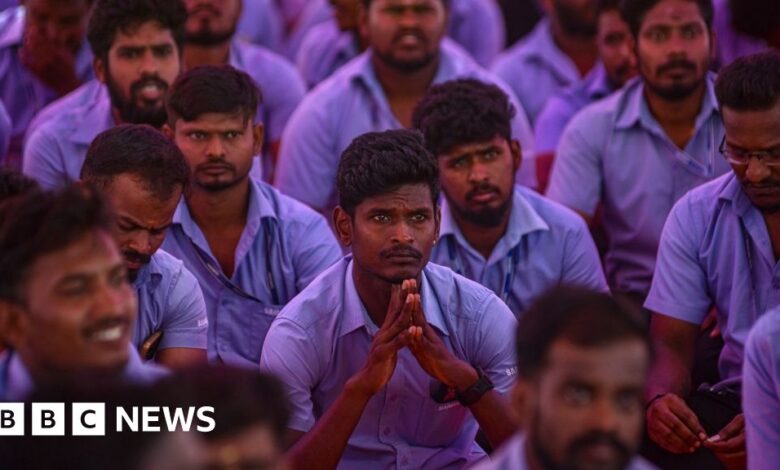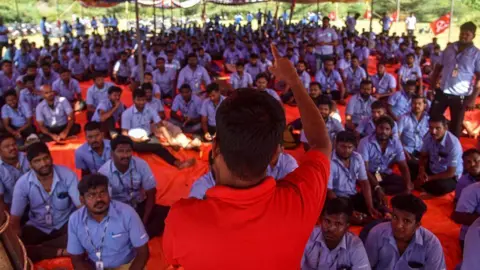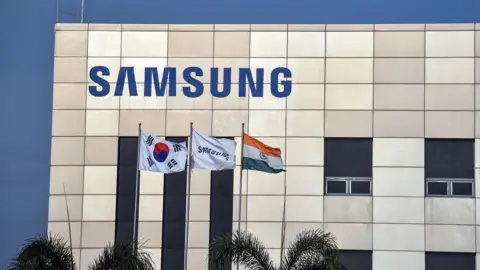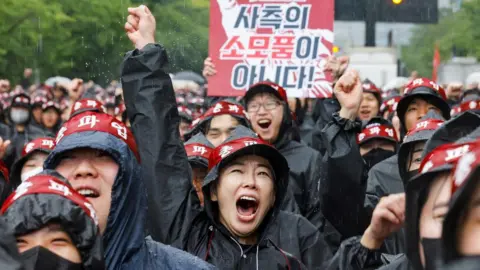Why hundreds of Samsung workers protested in India

 Reuters
ReutersFor the past 11 days, about 1,500 workers of South Korean tech giant Samsung Electronics have been on strike in the southern Indian state of Tamil Nadu, leading to major disruptions in production.
The Chennai factory, one of two Samsung plants in India, employs nearly 2,000 workers and makes home appliances, contributing about a third of the company’s $12bn (£9bn) annual revenue in India.
The striking workers have been gathering at a plot of land near the 17-year-old plant every day, demanding that Samsung recognize their newly formed union, the Samsung India Workers Welfare Union (SILWU). They say only the union can help them negotiate better wages and working hours with management.
The protest, one of the biggest Samsung has seen in recent years, comes even as Prime Minister Narendra Modi is courting foreign investment by positioning India as a viable alternative to China for manufacturing operations.
Samsung India has issued a statement saying that the welfare of its workers is the company’s top priority. “We have initiated discussions with the workers at the Chennai plant to resolve any issues as soon as possible,” the company said.
Hours earlier, police had arrested about 104 workers for participating in a protest march without permission. The protesters were released in the evening.
“The workers have decided to go on an indefinite strike until their demands are met,” said A Soundararajan, a member of the Centre of Indian Trade Unions (Citu), which is backed by the Communist Party of India (Marxist). Citu has supported the new union at the factory.
The workers have three main demands, Mr. Soundararajan said: Samsung must recognize the new union, allow collective bargaining, and reject competing unions because about 90% of the workforce belongs to the SILWU.
 Reuters
ReutersWorkers earning an average of 25,000 rupees ($298; £226) a month are demanding pay rises in stages, totalling a 50% increase over the next three years, according to Citu.
Citu also alleged that workers at the factory were “forced to complete each product – such as a refrigerator, washing machine or TV – within 10-15 seconds”, had to work non-stop for four to five hours at a time and worked in unsafe conditions.
Mr Soundararajan also alleged that the management pressured workers to leave the new union and their families were also threatened.
The BBC sent Samsung India a detailed set of questions to answer.
Meanwhile, Tamil Nadu Labour Welfare Minister CV Ganesan said he had assured union officials that talks were on to resolve their issues. “We will meet the demands of the workers,” he said.
Sijo*, a protester, said he reached the protest site every day at 08:00 IST (02:30 GMT) and stayed till 17:00, along with hundreds of workers wearing blue Samsung India uniforms.
The union arranged lunch and water for the protesters, while a makeshift canvas tent protected them from the elements. There were no restrooms, so workers used the outdoors.
“Since the factory was established, the employees have been working without any grievances or labor unions. But things have gotten worse in the past few years and now, we need the support of the labor union,” Sijo said.
He added that his salary had not kept up with the cost of living and this was putting pressure on his family’s finances.
As of 2020, Samsung Group is known for not allowing union representing workers. But things changed after the company came under intense public scrutiny after its chairman was indicted on charges of market manipulation and bribery.
 Reuters
ReutersMillions of Indian workers belong to unions – often backed by left-wing parties – who use their political clout to enforce labour laws and negotiate better conditions. “Foreign companies set up in India but do not comply with local laws on workers’ right to association and collective bargaining,” Soundararajan alleged.
Several prominent multinational companies, including Apple and Amazon, have set up factories in India. But labor activists allege that many of them underpay and overwork their Indian employees and collude with state governments to suppress workers’ rights.
Multinational corporations use a variety of “human resource strategies” to prevent workers from forming unions in developing countries like India, says Shyam Sundar, a labor economist.
First, they strongly oppose workers joining politically-backed external unions and encourage them to form “worker-led” internal unions. “This ensures that management has some control over union activities,” said Mr Sundar.
Mr Soundararajan alleged that management at the Chennai plant had also approached workers with this solution, but they had refused. The BBC has contacted Samsung India for a response.
The second way, Mr Sundar said, is to recruit young, unskilled workers, especially from rural areas, by luring them with good starting salaries. “These ‘interns’ are promised to become full-time employees after a few months, but that doesn’t happen. Salaries are also stagnant or have very low growth.”
He added that the rapid rise of the “flexible workforce” – employees hired on contract – had become a key strategy for multinational corporations to prevent unionization by ensuring a docile workforce.
According to the latest government statistics, Two out of five workers work in factories. In India by 2022, contract workers will account for about 40% of the workforce in industrial establishments.
“Companies use the threat of relocation or not expanding to discourage state governments from enforcing labor laws,” Sundar said. “But workers can leverage global labor unions to pressure companies to comply with international labor laws,” he added.
*Name has been changed to protect the identity of the worker
With contributions from Vijayanand Arumugam from BBC Tamil and Nikhil Inamdar from BBC News





